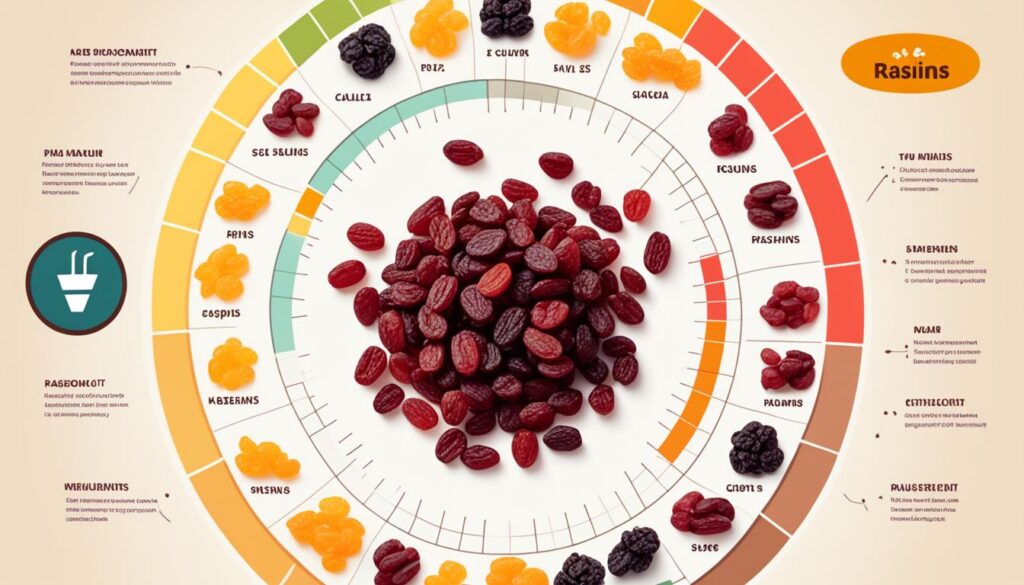Raisins are the dried grapes that many people love. They pack a lot of nutrients and flavors. But, it’s key to know the downsides of eating too many raisins. They were once used as money and for healing. Yet, their sugar and calories are something to watch.
Raisins come in types like sultanas and currants, each with its taste. They’re full of antioxidants and good stuff like boron. They can help your heart, stomach, teeth, and even prevent anemia.
Because they have lots of sugar and carbs, don’t eat too many. Eating lots of raisins can make you gain weight and feel bloated. Choosing organic raisins can help you avoid pesticides.
Still, raisins can be a smart snack in small amounts. They make recipes tastier and healthier. If you want, you can even dry grapes at home to make raisins.
While raisins have health perks, it’s best to enjoy them in small portions. This article covers the downsides of raisins. It also shows how to eat them safely for good health.
Key Takeaways:
- Eat raisins in small amounts because they’re high in sugar and calories.
- Watching how much you eat helps avoid weight gain from raisins.
- Raisins boost your health in many ways like improving your heart and reducing anemia risks.
- When picking raisins, organic options are better for less pesticide exposure.
- As a snack or recipe addition, raisins can be a healthy choice.
The Different Types of Raisins: Varieties and Characteristics
Raisins are a beloved dried fruit with many types. Each kind has its own flavor and texture. By knowing the different kinds, you can pick the best one for your cooking needs. We’ll look at the various raisin types, where they come from, and how they’re made.
Raisins
The word “raisins” means dried grapes of many grape kinds. These raisins are sun-dried or dehydrated. This makes them chewy and sweet with a bit of tang. You might know some like Flame Seedless, Muscat, Sultana, and Zante Currant.
Sultanas (Golden Raisins)
Sultanas come from Thompson Seedless grapes. They’re dried a bit differently, giving them a golden look and softer feel. They taste sweeter, kind of like honey or flowers. That’s why many people love them in baked goods and meals.
Currants
Currants are dried Black Corinth grapes. They’re small, tart, and darker than other raisins. Their bold flavor is great in baked recipes, like British fruitcake. They’re also used in foods from the Mediterranean and Eastern Europe.
Each raisin type adds something special, like taste, texture, or color. Whether you like traditional raisins, sweet sultanas, or tart currants, there’s a type for every taste and recipe.
Nutritional Profile of Raisins: Calories, Sugar, and Key Nutrients
Raisins are packed with energy-giving carbs. They’re a great snack choice. A quarter-cup has about 120 calories.
With their natural sweetness, raisins have around 26 grams of sugar per quarter-cup. They also have about 2 grams of fiber to aid digestion.
Sultanas and currants are raisin varieties with their own nutrition facts. Sultanas have 130 calories and 10 grams of sugar per serving. They contain 1 gram of fiber. Dried currants offer 110 calories and 27 grams of sugar, plus 3 grams of fiber, in the same serving size.
Raisins are full of nutrients like calcium and iron, important for bones and blood. They’re loaded with antioxidants to fight off harmful molecules.
Even without vitamin A, raisins have lots of antioxidants. They provide potassium for the heart and essential vitamins and minerals for health.
| Nutrient | Standard Raisins (Quarter-Cup) | Sultanas (Quarter-Cup) | Dried Currants (Quarter-Cup) |
|---|---|---|---|
| Calories | 120 | 130 | 110 |
| Sugar (grams) | 26 | 10 | 27 |
| Fiber (grams) | 2 | 1 | 3 |
| Calcium (milligrams) | 22 | 22 | 43 |
| Iron (milligrams) | 0.8 | 0.8 | 1.7 |
| Potassium (milligrams) | 298 | 291 | 437 |
| Vitamin A (micrograms) | 0 | 0 | 0 |
| Antioxidant Content | High | High | High |
Raisins have more calories and sugar than fresh grapes. But, they’re higher in fiber, potassium, and iron. Enjoy them in moderation for a balanced diet.

Potential Health Benefits of Raisins: Heart, Gastrointestinal, and Oral Health
Raisins might be sugary, but they offer health perks if eaten in small amounts.
Heart Health
Eating raisins often could make your heart healthier. This happens as they help lower blood pressure and sugar levels.
Raisins have lots of fiber, which is good for your digestion. This fiber prevents constipation. It also helps your gut stay healthy and can cut back on bloating and stomach cramps. The tartaric acid in raisins may also reduce inflammation, helping your digestive health.
Oral Health
Raisins have substances that fight germs in your mouth. This can stop cavities from forming. It also keeps your teeth and gums healthy. The antioxidants in raisins can keep your mouth’s pH level in check. This reduces the risk of tooth decay and gum problems.

Yet, it’s essential to eat raisins in small amounts. Eating too many can lead to weight gain because they are high in sugar and calories. If you have specific health issues, like diabetes or digestion problems, be careful about how many raisins you eat.
Adding raisins to a balanced diet is smart. They’re tasty on their own or as part of different recipes. Raisins can make your meals more exciting, with health benefits to boot.
| Health Benefit | Key Points |
|---|---|
| Heart Health | Eating raisins often may help reduce blood pressure and blood sugar levels. |
| Gastrointestinal Health | Fiber in raisins helps with digestion and may cut the risk of stomach problems. Tartaric acid can reduce inflammation, benefiting gut health. |
| Oral Health | Raisins’ antimicrobial properties can fight mouth bacteria, supporting healthy teeth and gums. Antioxidants in raisins prevent cavities by maintaining a healthy oral pH level. |
Anemia Prevention and Raisins: Iron and Nutritional Impact
Raisins are a tasty and healthy snack that can help prevent anemia. They have iron, which is needed for making red blood cells. These cells carry oxygen all over the body. Eating raisins often can help you get enough iron and lower your anemia risk.
Anemia makes you feel tired and weak because you have fewer red blood cells. Eating iron-rich foods like raisins helps keep your iron levels up. This supports healthy blood cells.
Studies in animals have shown that raisins could help prevent anemia. They might increase red blood cell counts. This lowers the chance of getting iron-deficiency anemia.
“Raisins, with their natural iron content, can be a valuable addition to a balanced diet when it comes to maintaining overall health and preventing anemia.”
But, we need more research to understand how raisins affect anemia in humans. You should eat raisins with other iron-rich foods. This helps your body absorb iron better and keeps your iron levels healthy.
To explain how much iron raisins have, here’s a table. It shows their iron content and how much of your daily need this covers:
| Raisins (Per 100g) | Iron Content (mg) | % of Recommended Daily Intake* |
|---|---|---|
| Sun-Maid Raisins | 1.9 | 11 |
| Dried Currants | 2.9 | 16 |
| Sultanas/Golden Raisins | 2.3 | 13 |

This table shows raisins have good iron content. Eating them helps you meet your daily iron needs. They are a fun and easy addition to your diet.
Raisins offer more than just iron. They have fiber, antioxidants, and potassium too. These nutrients support your health and lifestyle.
In the next part, we’ll look at the possible downsides of eating raisins. This includes how they might affect your weight and digestion.
Potential Drawbacks: Weight Gain and Digestive Issues
Raisins are a healthy snack, but eating too many has downsides. Weight gain and digestive issues are common concerns.
Weight Gain from Raisin Consumption
Raisins are calorie and sugar-dense. Eating too many can lead to weight gain. It’s important to control how much you eat, especially if you’re trying to lose weight.
Eat raisins in small amounts within a balanced diet. This way, you get the nutrients without too many calories. Enjoy raisins in moderation to avoid weight gain.
Digestive Issues from Raisin Consumption
Raisins have a lot of fiber, which is good for your gut. But too much can cause bloating, gas, and cramps.
People with IBS might react badly to the fiber in raisins. If you have digestive issues, watch how much you eat. It can help to avoid discomfort.
The Importance of Portion Sizes and Listening to Your Body
Keeping an eye on how much you eat is key. Too much can cause weight gain and tummy trouble.
Our bodies react differently to foods. Pay attention to how you feel after eating raisins. Adjust your intake as needed or seek medical advice.
Paying attention to portion sizes and your body’s feedback lets you enjoy raisins. This can prevent any negative effects.

Pesticide Concerns and Organic Options
Enjoying raisins means being aware of possible pesticide residues. Grapes for raisins often get sprayed to protect them. Also, raisin storage areas might be treated to prevent damage. Too much pesticide can lead to health problems, including cancer risk.
You can pick organic raisins to lower pesticide exposure. Organic farms don’t use synthetic pesticides, which is better for the planet. Organic foods, like raisins, often have fewer pesticide residues, making them safer and eco-friendly.

Organic raisins come from grapes grown without synthetic chemicals or GMOs. Organic farmers use natural methods like beneficial bugs, crop rotation, and natural fertilizers. This way, you get to enjoy raisins’ sweetness and benefits without worrying about pesticides.
“Opting for organic raisins can help reduce pesticide exposure and support sustainable farming practices.”
Choosing organic raisins cuts your exposure to harmful substances. Organic farming cares for soil health, biodiversity, and the environment. By picking organic, you’re looking after your health and helping the planet and organic farmers.
Advantages of Organic Raisins
There are several benefits to organic raisins:
- Reduced pesticide exposure: They’re grown without synthetic pesticides, which lowers your risk of residues.
- Environmental sustainability: Organic farming conserves soil, water, and biodiversity.
- Support for organic farmers: Buying organic raisins helps farmers committed to sustainable practices.
- Higher nutritional quality: Healthier soil from organic farming can boost the nutrients in crops, including raisins.
Look for the certified organic label when buying organic raisins. It confirms the raisins meet strict organic standards.
By choosing organic, you enjoy tasty, nutritious raisins. You also support sustainable farming. Try organic raisins as a snack or in recipes for a healthy, eco-friendly option.
Incorporating Raisins into Your Diet: Usage and Recipes
Raisins are tasty and good for you. You can eat them by themselves or add them to dishes. They make your food taste better and are healthy for you.
Sweet and Savory
Adding raisins can make foods sweeter or tastier. Here’s how to start:
- Put raisins in your morning yogurt, oatmeal, or cereal. It adds sweetness and texture.
- When baking cookies, muffins, or granola bars, add raisins. They bring a delightful flavor.
- Throw some raisins into salads. They go well with greens, nuts, and cheese, making salads exciting.
- In dishes like curries, stews, or tagines, raisins can be a garnish. They add a mild sweetness.
Snacks and Spreads
Raisins are great for snacking or making spreads. Here are some ideas:
- Combine raisins with almonds, walnuts, and dark chocolate for a trail mix. It’s great for energy.
- For homemade granola, mix oats, nuts, raisins, and honey. It’s tasty on its own or with yogurt.
- Make a spread by blending raisins, roasted nuts, spices, and water. It’s good on toast or with fruit.
Exploring the Possibilities
Raisins can make your cooking interesting. They can be a special addition to your meals. Try these ideas:
- Cook raisins with braised meats or vegetables. This adds sweetness to your dish.
- Stuff raisins in chicken or turkey with herbs and cheese. It makes the filling juicy and flavorful.
- Make a fruit salad with raisins, apples, oranges, and pineapples. Lemon juice adds a zesty taste.
Don’t be afraid to try new things with raisins. They can make any dish better. So, start using raisins in your kitchen today!
| Benefits | Usage | Recipes |
|---|---|---|
| Enhances flavor and texture | Mix with nuts and dried fruits for a trail mix | Homemade granola, cookies, muffins |
| Provides natural sweetness | Sprinkle on yogurt, oatmeal, or cereal | Granola bars, savory garnishes |
| Offers versatility | Toss into salads | Curries, stews, tagines |
| Makes a nutritious snack | Create a trail mix | Homemade granola, energy bars |
| Can be used in spreads and dips | Blend with nuts for a spread | Toast toppers, fruit dips |

Making Raisins at Home: Methods and Tips
Ever thought about making raisins at home? It’s quite easy to do. With a little time and effort, you can make your own raisins. You can use a food dehydrator or an oven.
Using a Food Dehydrator:
- Pick ripe, blemish-free grapes for sweetness.
- Wash them well and pick off any stems or bad berries.
- Spread them in one layer on the dehydrator trays. Make sure they’re not too crowded.
- Set the dehydrator to 135°F (57°C).
- Let them dry for 24 to 48 hours. Drying time varies by grape type and humidity.
- After they’re dry, let them cool. Then, store them in an airtight container.
Using Your Oven:
- Heat your oven to its lowest setting, around 175°F (80°C).
- Do the same as above: select, wash, and stem the grapes.
- Put the grapes on a parchment-lined baking sheet. Space them out.
- Keep the oven door ajar to let moisture out.
- Dry the grapes for 18 to 24 hours until they’re shriveled but pliable.
- Let them cool completely. Then, store in an airtight container.
Remember to keep things clean and safe, no matter the method you choose.

Homemade raisins are a rewarding project. You get to enjoy the making process. Plus, you ensure your raisins’ quality and ingredients. You can also try different grape types for unique flavors. It’s a fun, custom snack experience.
Conclusion
Raisins are a handy and healthy snack option. They’re full of fiber, antioxidants, and minerals like iron. These nutrients can help your heart, gut, teeth, and prevent anemia.
But remember, raisins are high in sugar and calories. So, it’s important to eat them in small amounts. This helps avoid weight gain. People with sensitive stomachs should also eat them carefully.
Go for organic raisins to reduce pesticide exposure. Raisins can make your meals more exciting. They add taste, texture, and nutrition. You can enjoy them by themselves or add them to dishes.
Ever thought of making raisins at home? It’s a rewarding DIY project. You can try different grapes and ways to dry them. Making your own lets you control the quality. Enjoy the unique taste of homemade raisins!










